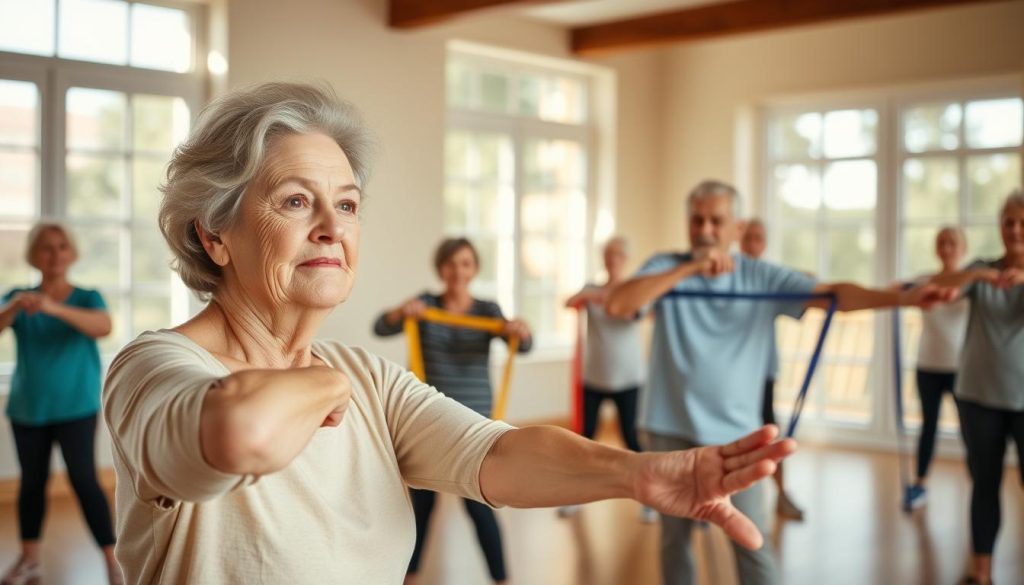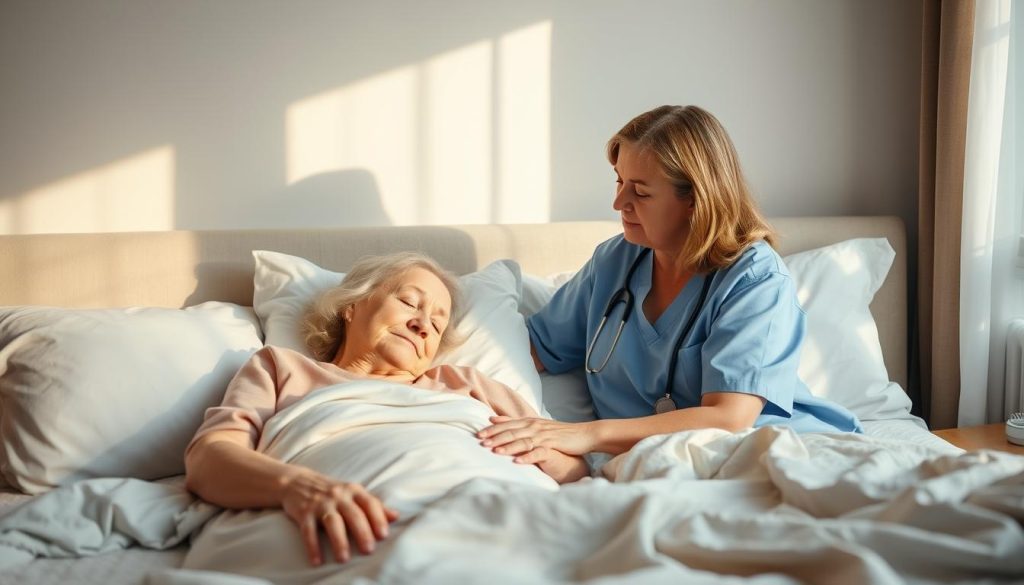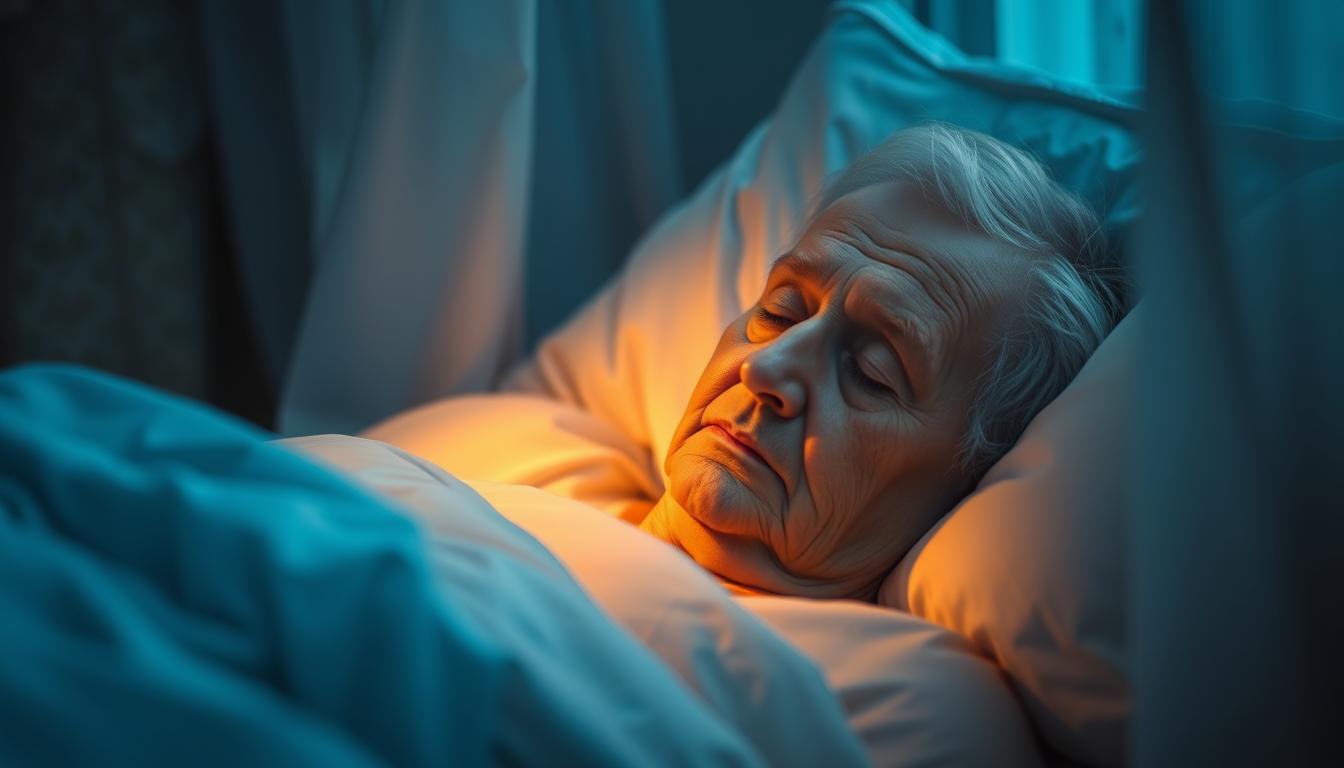It’s important to understand the sleep challenges that older adults face. Offering compassionate care can greatly improve their sleep. This approach helps ensure they get the rest they need, enhancing their quality of life.
Families and caregivers are key in this effort. It’s not just about helping them sleep enough. It’s also about making them feel understood and supported. We need to value compassionate care and work to reduce sleep problems in older adults.
Understanding Elderly Sleep Issues
Sleep is crucial for health and happiness, but older people often struggle. They face unique sleep challenges that can impact their quality of life. Let’s explore the common sleep issues in aging adults and why their sleep patterns change.
Common Sleep Problems in Aging Adults
Older adults often deal with sleep-related problems. Issues like restless leg syndrome, sleep apnea, and insomnia are common. Restless leg syndrome makes people want to move their legs at night, disrupting sleep.
Sleep apnea causes breathing pauses during sleep, leading to poor sleep quality. Insomnia makes it hard to fall or stay asleep, leaving seniors tired.
Why Sleep Patterns Change with Age
Several factors cause changes in senior sleep patterns. Physiological changes, like changes in the sleep-wake cycle, are key. Older adults also experience a shift in their circadian rhythms, leading to earlier bedtimes.
Psychological factors, such as anxiety and depression, can worsen sleep issues. Health conditions and medications used by seniors also play a role in these sleep disturbances.
Recognizing Signs of Sleep Disorders in Elderly
As we get older, our sleep habits can change. It’s key to spot the signs of sleep disorders in seniors. Knowing the signs of *senior insomnia* and *sleep apnea* helps improve their quality of life.
Insomnia Symptoms in Seniors
Insomnia is a common sleep issue for older adults. Seniors with insomnia might have trouble sleeping at night. They might also wake up a lot during the night.
They might wake up too early and can’t fall back asleep. They can feel tired during the day and irritable. They might also have trouble concentrating or remembering things.
Spotting these signs early is important. It helps manage and treat *senior insomnia* well.
Identifying Sleep Apnea in Older Adults
Sleep apnea is another common issue for seniors. It’s often not noticed because it happens while they’re asleep. Signs of sleep apnea include loud snoring and gasping sounds during sleep.
They might pause in breathing, noticed by a bed partner. They can feel very tired during the day. They might also have morning headaches and trouble concentrating.
By knowing these signs, caregivers and doctors can help. They can diagnose and manage *sleep disorders in elderly*. This leads to better health and well-being.
Impact of Elderly Sleep Issues on Overall Health
As people get older, good sleep becomes even more crucial. Sleep problems in older adults can make health issues worse. They can lead to heart disease by affecting blood pressure and causing artery blockages.
Memory loss and dementia are also big concerns. Lack of sleep can make these problems worse. Good sleep helps with memory and solving problems.
Mood issues like depression and anxiety are linked to sleep. Older adults with sleep problems often feel more emotional. This makes it harder to manage these feelings.

Sleep loss also weakens the immune system in the elderly. Good sleep helps fight off infections. Without it, managing pain becomes harder, making daily tasks more difficult.
Good sleep is key to overall health. Fixing sleep problems is important for the elderly. It helps them live a healthier, more balanced life. This shows the need for special sleep care for older adults.
Practical Tips for Improving Sleep Quality in Seniors
Ensuring a good night’s sleep for seniors involves focusing on both the sleeping environment and establishing healthy sleep routines. Here are some actionable tips to foster a more restful night’s sleep.
Creating a Comfortable Sleep Environment
Creating a comfortable sleeping environment is key. Keep the bedroom cool but not cold. This helps a lot. Also, reducing noise is important; white noise machines or earplugs can block out sounds.
Having the right mattress and pillows also makes a big difference. It’s all about comfort.
Establishing a Consistent Sleep Schedule
Keeping a regular sleep schedule is crucial. Encourage seniors to go to bed and wake up at the same time every day. This helps their body get into a rhythm.
Doing relaxing activities before bed, like reading or stretching, also helps. It tells the body it’s time to relax.
| Tip | Action |
|---|---|
| Temperature Control | Keep the bedroom cool |
| Noise Reduction | Use white noise machines or earplugs |
| Comfortable Bedding | Use appropriate mattresses and pillows |
| Regular Sleep Schedule | Go to bed and wake up at the same time daily |
| Relaxing Activities | Engage in light stretching or reading before bed |
Benefits of Safe Exercise for Better Sleep
Regular physical activity is key for better sleep in the elderly. It keeps the body and mind healthy, ensuring seniors get good rest. A safe exercise routine can really improve sleep quality for older adults.
Best Exercise Routines for Seniors
There are many safe exercises for seniors that help sleep. Walking, swimming, and yoga are great choices. They are easy on the body but still keep you healthy.

Strength training with light weights or bands is also good. It builds muscle without stressing the body. Tai chi is another option. It combines slow movements with deep breathing to help relax and sleep better.
How Physical Activity Aids Sleep
Physical activity naturally helps seniors sleep better. It leads to longer, deeper sleep cycles, which are essential for rest. Safe exercises for seniors can also lower anxiety and stress, improving sleep.
Exercise also boosts mood, thanks to endorphins. These chemicals make seniors feel good, making it easier to fall and stay asleep. Plus, it helps keep the body’s clock regular, leading to better sleep schedules.
So, adding safe exercises for seniors to daily routines is good for both physical health and sleep. It’s a win-win for older adults.
Addressing Anxiety and Stress in Elderly to Improve Sleep
The elderly often face many challenges that can cause anxiety and stress. These issues can greatly affect their sleep quality. Caregivers can help by using relaxation techniques and creating a calming bedtime routine. This can reduce senior anxiety and help them sleep better.
Relaxation Techniques
Relaxation techniques are great for reducing anxiety in the elderly. Methods like meditation, deep breathing, and progressive muscle relaxation can help a lot. They make it easier to relax and sleep better.
- Meditation: Daily meditation can help reduce senior anxiety. Even a few minutes of focusing on breathing can calm them down.
- Deep Breathing Exercises: Encourage seniors to do deep breathing. This involves slow, deep breaths that relax and lower stress.
- Progressive Muscle Relaxation: This technique involves tensing and then relaxing each muscle group. It helps reduce stress and brings calm.
Creating a Calming Bedtime Routine
Creating a calming bedtime routine is key to signaling it’s time to sleep. For the elderly, this might include quiet activities like reading, listening to soft music, or a warm bath before bed.
- Reading: Reading can help seniors relax and transition to bedtime smoothly.
- Listening to Soft Music: Gentle music can reduce stress and anxiety, making it easier to sleep.
- Warm Bath: A warm bath an hour before bed can relax muscles and prepare the body for sleep.
By adding these techniques to daily routines, caregivers can greatly help. They can reduce senior anxiety and improve sleep quality. This enhances the quality of life for the elderly.
Medication and Its Role in Elderly Sleep Patterns
It’s important to know how medicine affects sleep for older adults. Many drugs for common age-related problems can mess with sleep. This can make sleep issues worse.
Common Medications Affecting Sleep
Some medicines, like beta-blockers, diuretics, and antidepressants, can disrupt sleep in the elderly. They might cause trouble falling asleep, waking up a lot, or make sleep problems worse.
| Medication Type | Potential Sleep Effects |
|---|---|
| Beta-blockers | Can cause insomnia and nightmares |
| Diuretics | Frequent urination leading to sleep interruption |
| Antidepressants | Can cause insomnia or drowsiness |
Consulting Healthcare Professionals
Talking to doctors is key when older adults have sleep problems. Doctors can tweak medications to reduce side effects. They can also find sleep-friendly alternatives. Managing elderly sleep medication is vital for treating health issues without harming sleep.
Diet and Nutrition: Their Effect on Sleep Quality in Seniors
Proper diet and nutrition are key to better sleep for seniors. Knowing how food affects sleep can help choose better foods for a good night’s rest.
Foods That Promote Better Sleep
Include foods that help you relax and sleep, like almonds and cherries. They have melatonin and magnesium, which help sleep. Eating these foods an hour before bed can lead to a better night.
Also, eat complex carbs like oatmeal and whole grains to boost serotonin. This makes you relax. Herbal teas, like chamomile, are great too. They have compounds that help you sleep better.
Avoiding Sleep-disruptive Substances
Stay away from things that mess with your sleep. Caffeine and alcohol are big sleep disruptors. Caffeine can affect you for up to eight hours. Cut down on it, especially in the afternoon and evening, to sleep better.
Alcohol might make you sleepy at first but can mess with your sleep later. It makes you restless. Also, big meals before bed can cause discomfort and indigestion. This makes it hard to sleep.
Have light meals in the evening and avoid spicy or high-fat foods. If you’re hungry before bed, try a banana or some nuts. These are good for sleep without causing trouble.
Being aware of how diet affects sleep can really help seniors sleep better. By picking the right foods and avoiding sleep disruptors, you can get a restful night’s sleep.
The Role of Caregivers in Managing Sleep Issues in Older Adults
Caregivers are key in helping seniors sleep better. They help spot and fix sleep problems in older adults. They do more than just watch; they help make sleep spaces comfy for seniors.
Setting a regular sleep schedule is a big job for caregivers. They help seniors stick to a routine, even on weekends. This can really help their sleep. They also help create a calm bedtime routine with relaxation techniques.
Caregivers also check on medications that might mess with sleep. They talk to doctors to make sure meds don’t hurt seniors’ sleep.

They also look at what seniors eat and exercise. Caregivers make sure seniors don’t eat or drink things that mess with sleep. They also help with safe exercises for seniors.
In the end, caregivers do a lot to help seniors sleep well. They focus on all parts of a senior’s life. Their help makes a big difference in seniors’ sleep and overall happiness. Caregivers work together with seniors to solve sleep problems.
Promoting Better Sleep Hygiene for the Elderly
Understanding the importance of senior sleep hygiene can lead to significant improvements in overall well-being. A crucial aspect involves creating a bedroom environment conducive to rest. Maintaining a dark, quiet bedroom helps in reducing disturbances. Consider blackout curtains or an eye mask to lessen light interference and a white noise machine or earplugs to minimize noise.
Equally important are the bedtime habits for seniors. Limiting screen time before bed is crucial, as the blue light emitted by phones, tablets, and computers can interfere with the production of melatonin, the sleep hormone. Encourage reading a book or listening to calming music as alternatives.
Avoiding naps late in the day is another beneficial practice within senior sleep hygiene. Opt for shorter naps earlier in the afternoon to prevent interference with nighttime sleep patterns. Consistency is key; maintaining a regular sleep schedule helps to regulate the body’s internal clock.
Creating a sustainable bedtime routine is essential in fostering healthy sleep habits. Here are some tips:
- Set a regular sleep and wake time, even on weekends.
- Engage in a relaxing pre-sleep activity, such as taking a warm bath or practicing gentle yoga.
- Avoid large meals, caffeine, and alcohol close to bedtime.
In summary, focusing on effective senior sleep hygiene and cultivating positive bedtime habits for seniors can dramatically enhance sleep quality and overall health, making these small changes worthwhile.
Encouraging Emotional Support and Understanding
It’s key to make sure elderly people get enough emotional support. Family, friends, and caregivers are vital in creating a caring space. Here, seniors feel heard and valued, which helps with sleep issues.
Being patient and empathetic helps seniors share their feelings freely. Seeing emotional support as a key to better sleep improves their rest and overall health. A supportive network helps seniors face sleep challenges together, reducing stress and anxiety.
Offering emotional support to the elderly needs ongoing effort and understanding. By paying attention to their needs and showing real care, we can help them sleep better. This support leads to a more peaceful life, boosting their health and happiness.

